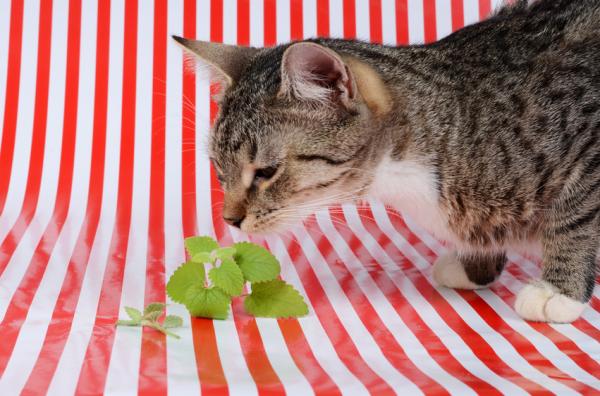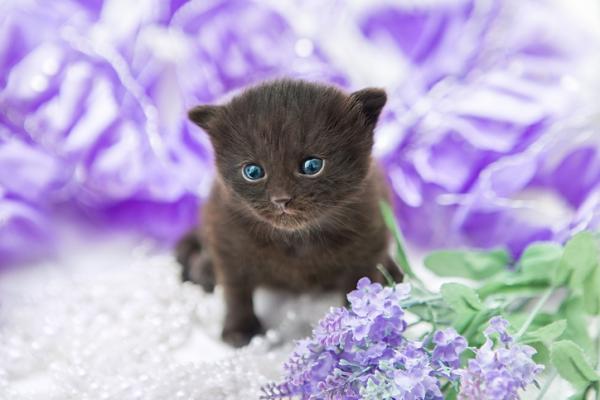10 scents that attract cats
The cat’s sense of smell is 14 times better that of the human, so that it is much more developed and allows it to perceive aromas in a more intense way. This advantage is very useful to easily notice those smells that you love but also to quickly identify those you hate.
If you are one of those people who keep the home well perfumed, or tend to use essential oils for natural therapies, and want to use those aromas that do not disturb your hairy companion, read on! In this article we share 10 scents that attract cats. Of course, we anticipate that not all cause the same effect in all felines, since some can generate the opposite effect and we explain why.
Catnip
La Nepeta cataria, better known as catnip or catnip, exerts on the animal a powerful narcotic effect. The active principle nepetalactona found in the composition of the plant, produces a psychoactive impact on cats that lead them to stimulate their mind and encourage them to play and move. In this way, when a feline smells the aroma of catnip, it tends to rub with it, lick it, eat it and show unusual behavior, such as jumping and even hunting non-existent animals.
By stimulating the animal’s mind and keeping it active, the catnip is one of the most beneficial plants for them, in addition to the smell that attracts cats the most. More information in our article on “Catnip properties”.

Olive
Considered as another of the smells that enchant cats, the olive tree produces in these animals, too, a narcotic effect that alters its behavior. This is so because of one of the most active components of the leaves of the olive tree and troco, a substance called oleuropein. As with the catnip, when it catches its scent, the cat tends to rub, lick, eat its leaves and show a more active behavior, even during the heat seasons.
Some cats have this attraction only with leaves, while others are attracted to all parts of the olive, from olives to olive oil. Likewise, it has not yet been shown to exert a calming or relaxing effect on cats, so we can not affirm this fact but it does affect their central nervous system and make them more active and playful.
Honeysuckle
Honeysuckle or honeysuckle is part of Bach’s popular flowers and, as such, acts on the cat’s organism exerting a powerful soothing and soothing effect. In this way, we can say that the aroma that this plant gives off represents one of the smells that relax cats. So much so, that currently these types of plants are used in cats and other animals for therapeutic purposes, such as treating insomnia, stress or anxiety.
As with the previous plants, the composition of the honeysuckle attracts the felines and makes them want to rub on the plant, lick it and eat it. But beware! Honeysuckle berries are toxic for cats, so it is essential not to let them consume this plant, simply sniff it and enjoy its aroma.
Lavender
As with humans, the scent of lavender attracts cats, causing them to come close to sniffing it and wanting to rub on it. However, its power of attraction is not as powerful as that of previous plants and, therefore, it is possible that some cats are not equally interested and even reject the plant.
If your furry companion is one of those who love this smell, you can make use of lavender essential oil to improve the environmental enrichment of the animal and also encourage a state of relaxation. Especially in cases of anxiety and a small degree of aggressiveness, it has been shown that the use of this natural therapy, along with other relaxing factors and the finding of the cause of the problem, help the animal to be calmer.

Thyme
Thyme is not only part of the smells that attract cats, but it is also one of the most beneficial plants for them. Thanks to its soothing and anti-inflammatory properties, prepared in the form of an infusion Helps treat irritated and inflamed eyes of these animals, so that it alleviates the symptoms produced by conjunctivitis, for example, or a certain allergy.
On the other hand, its aroma acts as a natural relaxant and, therefore, promotes tranquility in the cat. For this, the ideal is to use thyme essential oil or let the plant smell. Of course, as with lavender, thyme may not be as effective, since not all felines are attracted to its smell.
Peppermint, basil and mint
Both peppermint and basil and mint they are part of the same family as catnip, the Lumiaceas family. Therefore, it is not surprising that the aroma of these plants so used in the kitchen also form the smells that enchant cats. Thus, felines who are attracted to them show the same symptoms described in the section dedicated to catnip, activation and mental stimulation.
Floral aromas
Many cats feel trapped by the intense smell of some flowers such as roses, daisies or lilies. Of course, if it is the case of your feline, you should know that some of them are highly toxic if they are ingested, as the last two. In this way, you can make use of the essential oil of that flower in question, but better keep the plant away from your reach to avoid possible poisoning.
Fruit aromas
Fruits such as strawberries, peach or watermelon, give off very characteristic and intense aromas that quickly catch the attention of cats. In this way, certain fruit aromas can suppose pleasant smells for cats and encourage them to taste the food. Many of them, even, bring multiple benefits to your body, such as antioxidant, depurative and diuretic properties, as well as fiber and a large amount of vitamins. Of course, not all fruits are attractive to these animals, since citrus give off a really unpleasant aroma for them.
If you notice that your cat is attracted by the smell of some fruits, do not miss our article with the list of most recommended fruits for cats and start offering them as a reward.
What is your cat’s favorite smell?
After reviewing the list of the smells that most attract cats, tell us, what is the smell that your cat loves the most? Surely you have identified that there is a certain plant, food or object that has your furry friend dazzled and whenever he identifies he comes to him with enthusiasm and speed.
Likewise, and as we have already indicated throughout the article, not all the scents mentioned are pleasant for all cats, since every animal is a world and has its own tastes. In this way, it is possible for a feline to adore the scent that comes from thyme but completely reject that of lavender. In this regard, we encourage you to review the post intended to explain the “10 scents that hate cats”.
If you want to read more articles similar to 10 scents that attract cats, we recommend that you enter in our Curiosities section of the animal world.


